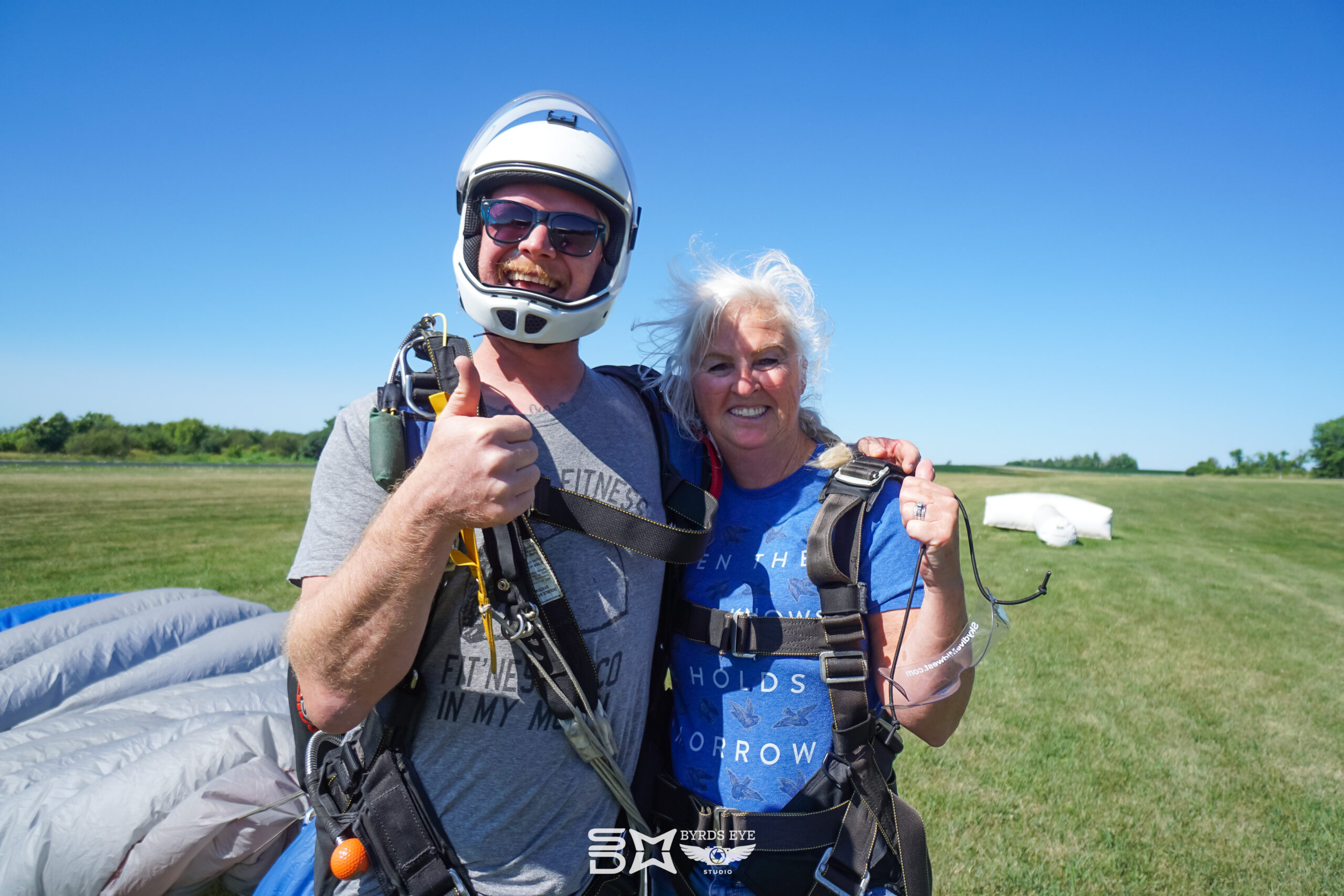WHO CAN MAKE A TANDEM SKYDIVE?
One of the beautiful things about skydiving is it’s a pretty accessible activity for most people. There are some things to take into consideration but only a few hard and fast rules when it comes to the criteria for who can make a tandem skydive.
The basic requirements for a tandem skydive are:
- You must be 18 or older.
- The tandem skydiving weight limit is 250lbs or less.
While there are some other things to think about, these are the minimum requirements. Below we’ll talk you through the basics and give a little background behind each requirement. We’ll also cover some of the most common questions about eligibility to make a jump.
Is there a weight limit for skydiving?
Yes, maximum weight limit for tandem skydiving is 250 pounds. This is based on the equipment manufacturer’s specifications regarding the maximum suspended weight for the tandem harness and parachute container system.
How tall do you need to be to skydive?
If you’re vertically challenged, you can still skydive! It’s not like a roller coaster. As long as our instructor can secure you properly in a harness, you’re good to jump.
How old do you have to be to go skydiving?
You must be 18 or older with a government issued, photo ID. This is a regulation set by the United States Parachute Association.
Can I give my underage child permission to go skydiving?
No, you may not. All tandem students must sign a waiver in order to participate. You cannot sign a waiver on behalf of a minor.
Is there an upper age limit to go skydiving?
There is no upper age limit for skydiving. We’ve had customers close to 100 years old jump with us. However, older customers should consider their physical health and ability before deciding to make a jump.

Do you need any physical abilities to go skydiving?
The physical abilities required are minimal but still worth considering. Know your own level of fitness and if you are unsure, consult your doctor.
- Stairs - You will need to be able to climb a set of stairs to get into the airplane.
- Standing - You will need to be able to get to your feet from a seated position on the floor of the airplane. Your instructor can help you a little with this.
- Opening Shock - There is some force associated with the rapid deceleration of the parachute upon opening. It isn’t usually painful, but it can be a little jarring.
- Landing Position - You will need to be able to lift your legs for the landing procedure. When seated in a chair, if you cannot lift both legs straight out in front of you, you may not be fit enough to skydive.
- Landing Force - You will be sliding in on your bum for landing. Often, landings are very smooth but some can be bumpy. Think about if your body can handle a bit of a bump when you touchdown.
Can I skydive with an injury?
Because of the physicality involved in skydiving, there’s always a risk of re-injury, especially if you aren’t completely healed. You should speak with a doctor prior to scheduling a jump. Shoulder injuries and dislocations are particularly problematic. The wind force can cause weak or improperly healed shoulders to dislocate in freefall. Feel free to call with questions about specific injuries and speak with our safety and training advisor prior to scheduling.
Can I skydive with a disability?
We can accommodate many different types of disabilities. We are well known for our work with disabled veterans and have been able to successfully jump with paraplegic, quadriplegic, blind and deaf tandem students in the past. However, this question is best answered on a case-by-case basis. You should call and speak with our safety and training advisor prior to scheduling your jump to make sure we can accommodate your needs.
Can I skydive with a medical condition?
Medical questions are best left to the professionals. You may need to consult your doctor about how skydiving might impact your condition. Any medical conditions disclosed on your waiver will require a doctor’s note in order to jump. We’ll do our best to give some guidance if you have questions about a specific condition but we may refer you back to your doctor if we aren’t sure of the risks.
Can I skydive while pregnant?
If you speak with your doctor, they will tell you absolutely not. Their job is to advise conservatively to avoid added liability. For the same reason, we do not allow customers to skydive during pregnancy.
Can I skydive if I’m afraid of heights?
You might be surprised how many of our licensed skydivers report being afraid to climb a ladder but have no problem jumping out of an airplane. Skydiving doesn’t feel like falling, there is no stomach drop sensation like a roller coaster. You’re also so far above the ground when you exit, there’s no ground-rush. There’s no reason you can’t jump with a fear of heights. It’s an issue of mind over matter.
Can I skydive if I wear glasses or contacts?
Yes, you can. You’ll be issued a pair of goggles to use that should keep the wind from disturbing your contacts. We also have larger, over-the-glasses goggles that should fit over most glasses. Either way, we’ve got you covered.
By now you should have a pretty good idea about whether you meet the requirements to skydive. If you still have questions, feel free to call our office at 262-886-3480 or send an email to Info@skydivemidwest.com If you’re looking for even more information on skydiving, check out the links below:
